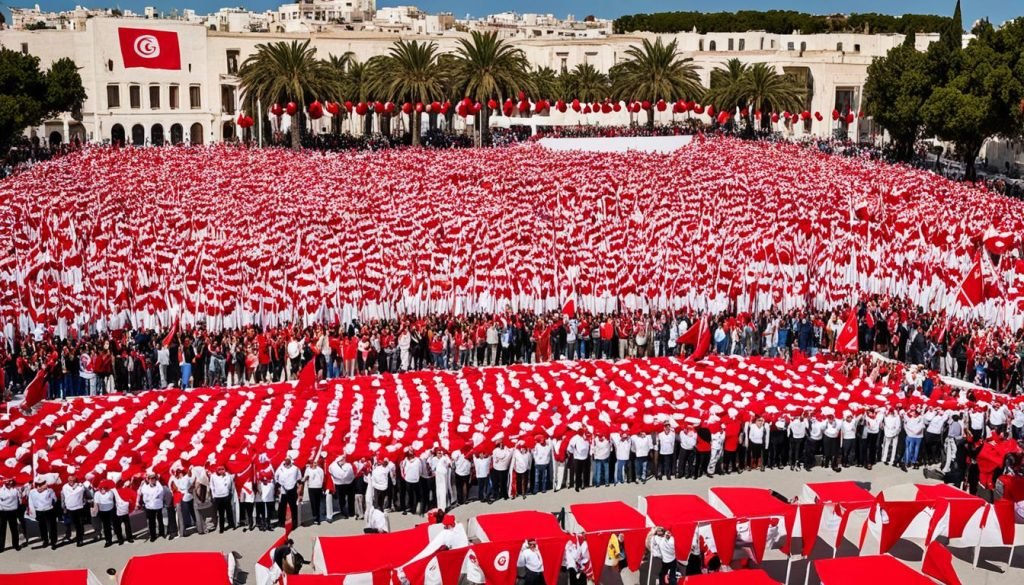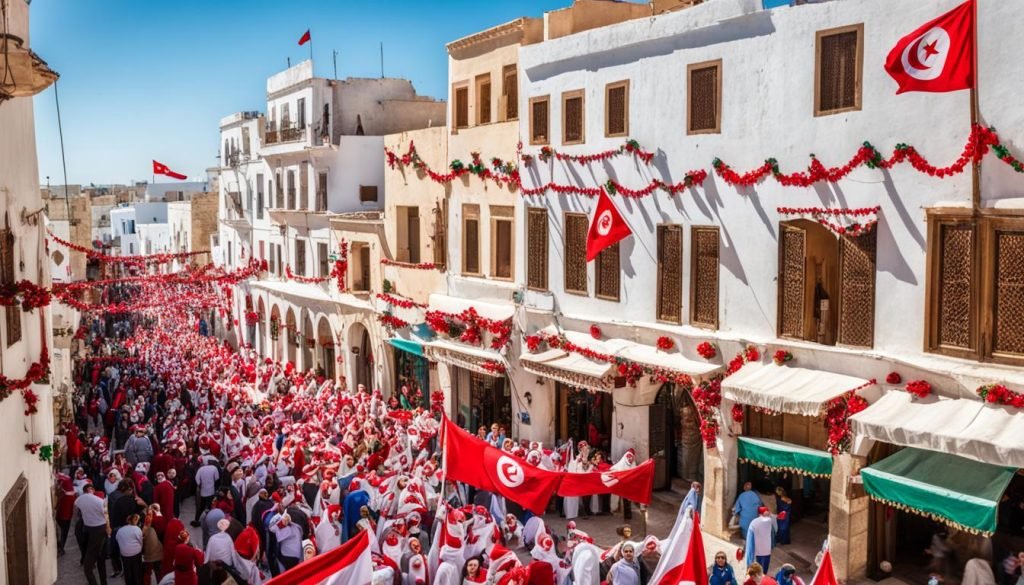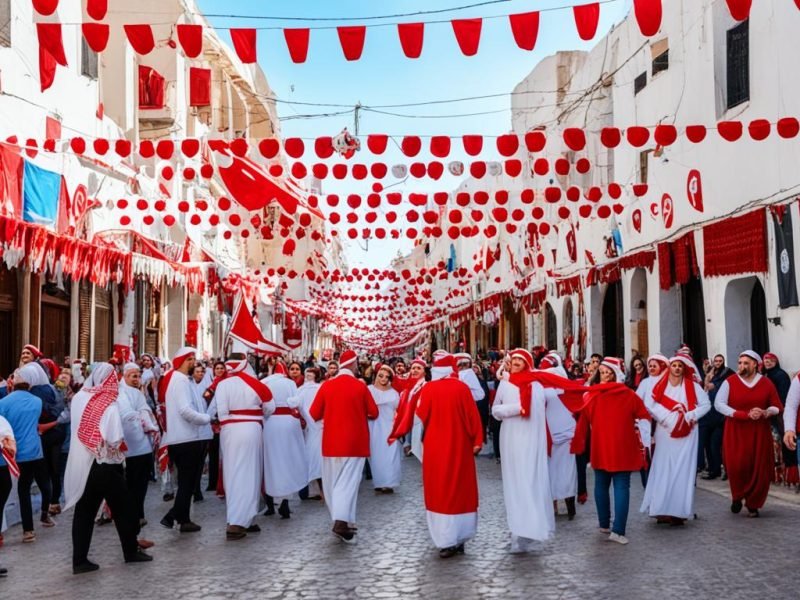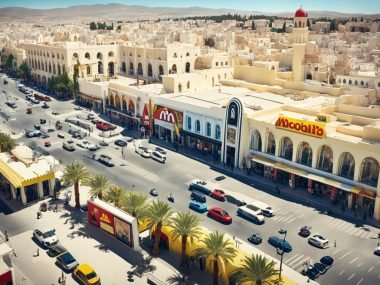Do you know about Tunisia National Day on March 20th? It’s a big day for the country. It marks the time Tunisia became its own nation, after being controlled by another country. This day is not just important in Tunisia but all over the world. It shows that countries can decide their own future.
The celebrations on this day are full of life. They show how proud Tunisians are of their history and culture. It’s a time of joy and pride for everyone.
Key Takeaways
- Tunisia National Day is celebrated on March 20th.
- This day commemorates Tunisia’s independence from French colonial rule in 1956.
- The Tunisian National Day celebration highlights Tunisian culture festivities.
- This public holiday is a testament to Tunisia’s journey to sovereignty.
- The event is globally significant, symbolising triumph over colonialism.
Tunisian Independence Day Date
Tunisia celebrates its Independence Day to remember the end of French rule. The path to freedom took a lot of work over many years.
The Historical Context Behind the Date
The fight for freedom started in 1920 with the Destour party. Later, in 1934, Habib Bourguiba formed the Neo Destour party. They protested and fought hard, making the French listen.
Key Dates Leading to Independence
The journey to freedom began in 1920 with the Destour party. The Neo Destour party joined in 1934, strengthening the fight. Tunisia became free on March 20, 1956, a day now celebrated yearly.
| Year | Event |
|---|---|
| 1920 | Formation of Destour Party |
| 1934 | Establishment of Neo Destour Party |
| 1956 | Independence Granted on March 20th |
History of Tunisian Independence
The story of Tunisia’s fight for freedom is both complex and inspiring. It shows the strong spirit of its people. They faced many challenges but kept pushing for their own sovereignty.
Role of the Ottoman Empire
Tunisia was once ruled by the Ottoman Empire. This time was important for shaping Tunisia. It affected culture and how things were run. Even then, Tunisians dreamed of running their own country.
Tunisia as a French Protectorate
Later, Tunisia came under French control in 1883. The French changed a lot in Tunisian society. During this time, Tunisians started to fight for their independence. Groups like Destour and leaders like Habib Bourguiba led the charge. They helped unite everyone for independence.
When Is Tunisia National Day?
March 20th is very important in Tunisia. It shows their strong spirit and love for freedom. Tunisia National Day is on this day. It remembers the day in 1956 when Tunisia became free from France. This day is special. It’s a day full of Tunisian culture festivities that bring people together.

On this day, Tunisians do many fun activities. They show their national pride and history. You can see big groups enjoying traditional music, dance, and food. These parties show Tunisia’s rich history. They remind everyone of the country’s strength and togetherness.
A big part of the holiday is showing off national colours. Towns and cities look beautiful with flags, banners, and lights. Children wear traditional clothes for parades. Public places have speeches and shows about Tunisia’s history.
This day is also for remembering the fight for independence. Leaders hold special events to remember this. They also talk about Tunisia’s bright future. The day is about looking back and celebrating. It brings everyone in Tunisia closer in pride and joy.
| Event | Description |
|---|---|
| Traditional Music and Dance | Performances in public spaces highlighting national heritage |
| Decorative Displays | Flags, banners, and lights representing national colours |
| School Parades | Children dressed in traditional attire marching through streets |
| Official Ceremonies | Political leaders commemorate the independence struggle |
The Significance of Tunisian Independence Day
On March 20th, Tunisia celebrates Independence Day. It marks the struggle for sovereignty. This day is huge for Tunisia. It remembers the end of French rule. It also starts a new era for the nation.
The people worked hard for independence. They wanted to control their own land. On June 25th, 1957, Habib Bourguiba became the first president. This was a big step for freedom. It also helped Tunisia grow in many ways.
This story is very important for Tunisians. It’s about national pride and identity. The day looks back on big sacrifices. But it also looks forward to a better future. So, the day is very special in Tunisia’s history.
How Is Tunisia National Day Celebrated?
The Tunisian National Day celebration is a joyful event for all. Across Tunisia, from busy cities to quiet towns, everyone comes together. It’s a day of happiness, pride, and deep love for the country. There are many fun activities and big events to mark this important day.
National Celebrations and Parades
Grand parades in the capital, Tunis, and other places are a big highlight. These parades show off Tunisia’s military, culture, and pride. People come in great numbers to see the bands, dancers, and floats. Leaders of the country watch over everything.
Fireworks and Wreath-Laying Ceremonies
At night, the sky fills with bright fireworks. They represent the joy and freedom of being independent. There are also quiet ceremonies to remember those who fought for Tunisia. People lay wreaths at monuments to honour these brave souls.
Decorations and Flag Displays
Before and on the holiday, streets are beautifully decorated. Red and white, the national colours, are everywhere. Flags wave from buildings, cars, and houses. It’s a beautiful sight that shows how united and strong Tunisians are.
Public Holiday in Tunisia
Tunisia has many public holidays that show its rich culture and history. Tunisia National Day stands out. It is celebrated with joy and unity.
List of Public Holidays in Tunisia
This is a full list of Tunisia’s public holidays. They highlight the various parts of Tunisian culture:
- New Year’s Day
- Tunisia National Day
- Martyrs’ Day
- Labour Day
- Republic Day
- Women’s Day
- Evacuation Day
- Revolution Day
- Eid al-Fitr
- Eid al-Adha
- Islamic New Year
- Mawlid

In Tunisia, public holidays are more than just days off. They are filled with the spirit of Tunisian festivities. Both locals and visitors love to join in and celebrate.
Tunisian History Commemoration
Tunisian history’s commemoration is a time for reflection and celebration. It is important during Tunisian Independence Day. This day lets us honour the past, see our present, and aim for a bright future.
Tunisians gather to remember their fight for freedom. They pay tribute to the heroes who fought for Tunisia’s freedom.
Reflection on the Struggle for Independence
Every year, Tunisians reflect on their hard fight for independence. This reflection shows how important independence is. It reminds us of what our ancestors went through for freedom.
Events and gatherings help tell stories from the past. They fill everyone with pride and thankfulness.
Renewed Commitment to the Nation’s Future
The commemoration also promises a better future for Tunisia. Inspired by our past, we pledge to build a thriving nation. Our goal is to make the dreams of our founders come true.
Celebrations show our achievements and boost our national spirit. They push us to aim high for Tunisia’s future.
Tunisian National Events
Tunisia loves celebrating its history, culture, and achievements all year. These events show national pride. They reflect on Tunisia’s growth since becoming independent.
One top cultural event is the Carthage Film Festival. It’s a big movie festival that happens every year. People from all over the world come to see Tunisian films and filmmakers.
The International Festival of Hammamet is another big event. It’s full of dance, music, and theatre. This festival shows off Tunisian culture’s creativity and brings people together.
Here are some events we celebrate:
| Event | Month | Description |
|---|---|---|
| Carthage Film Festival | October | Focuses on African and Arab cinema, fostering cultural exchange. |
| International Festival of Hammamet | July-August | A vibrant annual gathering of performing arts, including music, dance, and theatre. |
| Festival of the Sahara | December | A celebration of Saharan cultural heritage, featuring traditional music, dance, and camel races. |
| Medina Festival | May | Highlights Tunisia’s rich history with events staged in the historic quarters of Tunis. |
These events are very important to Tunisia. They make everyone feel united and proud. These celebrations help keep Tunisia’s history and bright future alive. They are key to the country’s identity.
Conclusion
Tunisian National Day shows the strong spirit of the nation. It’s a day to remember the past and look forward to the future. People celebrate with parades, fireworks, and wreath-laying ceremonies.
This day means more than just history. It’s about liberty, progress, and coming together. It teaches young people to love their country. And it reminds us of the hard work and resilience of our ancestors.
The celebration is a look at the nation’s journey. It fills the country with pride and unity. As Tunisia grows, this day’s importance stays strong. It reminds us to cherish our past and welcomes a hopeful future.







